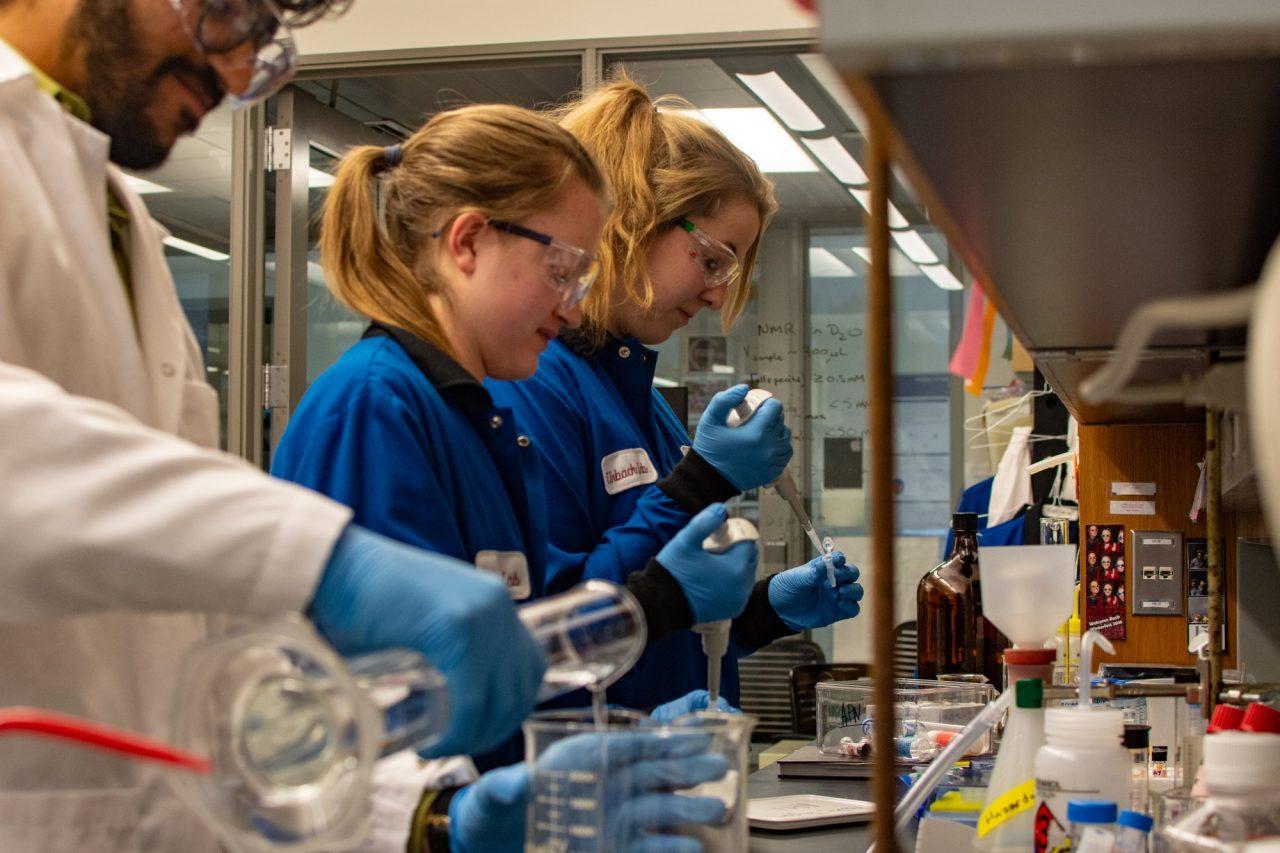photo by Genevieve Humphreys
“The Chemistry Department believes that the best way to learn chemistry is to do chemistry, and the best way to do chemistry is in the research laboratory,” wrote Chris Pursell, professor and chair of the Department of Chemistry, in an email.
To accomplish this goal, the department offers a variety of research opportunities for students.
“All chemistry faculty are actively engaged as teacher-scholars; this includes mentoring students in their research labs. Students become active learners as they work on projects and contribute to the advancement of science,” Pursell wrote.
Adam Urbach, professor of chemistry, is one of the many faculty members who conducts their own research and advise student research. To meet students’ desires to be involved and have experiential learning opportunities, the Department of Chemistry offers a summer research program in which students work with faculty on innovative projects.
“The Chemistry Department has a very long tradition of summer research. It’s at least four decades old. Our program is relatively large on a national level for chemistry research at liberal arts institutions,” Urbach said.
Like all summer research programs at Trinity, the chemistry program consists of 10 weeks of full-time research and allows students to stay in on-campus residence halls and receive support through stipends.
Urbach’s research this summer will largely be in two areas: one in the development of new materials for drug delivery and another studying the effects of protein disorder on binding.
“Drugs are packaged into a material that slowly erodes over time and releases the drug. This approach doesn’t work for protein-based drugs like insulin, and [in the first project], my laboratory has developed an effective way to target and manipulate insulin,” Urbach said.
In sum, Urbach and his students will develop materials that can slowly release protein-based drugs like insulin.
“[In the other project,] we’re studying small proteins that are disordered, that don’t fold. There’s very little understood about how to target disordered or unfolded proteins using drugs, so we believe that our technology is well suited to this goal.”
Trinity students work closely and carefully to carry out the research.
“Students are involved in all aspects of the project, from design to running experiments, to analyzing data to presenting the results and writing up for publication,” Urbach said.
Some of the content of their research can’t be shared just yet as publishing it would be considered public disclosure and could limit their opportunities to establish patents and develop proprietary technology.
“We’re also working in collaboration with Harvard Medical School as well as the Scripps Research Institute and the University of Maryland,” Urbach said.
This summer, five students will be involved in conducting research, including two rising sophomores and three rising juniors. Two students graduating this May, senior chemistry majors Zoheb Hirani and Hailey Taylor, will also assist on the project.
Hirani and Taylor are only some of the students who have been conducting research under Urbach’s direction. They have been working on their project since 2015. They discussed and presented their research to a panel of department faculty on April 18.
“We were giving a thesis talk on the culmination of all of our research over the last four years as we’ve been working on the same extension of a project in Dr. Urbach’s laboratory,” Hirani said. “We’re interested in studying the binding behavior of a synthetic host molecule and how it targets protein selectively. This host molecule has been used in a lot of different applications so far, with catalysis and possibly drug delivery.”
Working 12 to 18 hours every week, Taylor and Hirani worked semesters and summers to develop their research.
“I joined this lab my first week here at Trinity, and it’s been a really amazing ride. Professor Urbach’s an amazing role model. He teaches us how to think about the science, how to run the experiments,” Hirani said.
After three summers of hard work, it all began to come to fruition as the research pair was able to publish their study in the Journal of the American Chemical Society. It has been both a rewarding and challenging experience.
“The research here is really set up to somewhat emulate the graduate school research experience … That experience of being immersed in science and truly trying to push it forward has been amazing,” Hirani said. “But the most challenging thing is trying to balance it with all the other undergraduate things you have to do, like classes and having a normal life.”
Committed to Northwestern University for his graduate school, Hirani has bold future research plans.
“My dream is to be a material science chemist and prepare materials that will hopefully help out with climate change. A lot of industrial processes produce a lot of waste … so if I could design chemical materials that trap pollutants and waste and convert them into good stuff that we want, that would be the ultimate goal,” Hirani said.
Students interested in applying to the chemistry department’s summer research program can reach out to chemistry professor Corina Maeder, who coordinates these opportunities.






